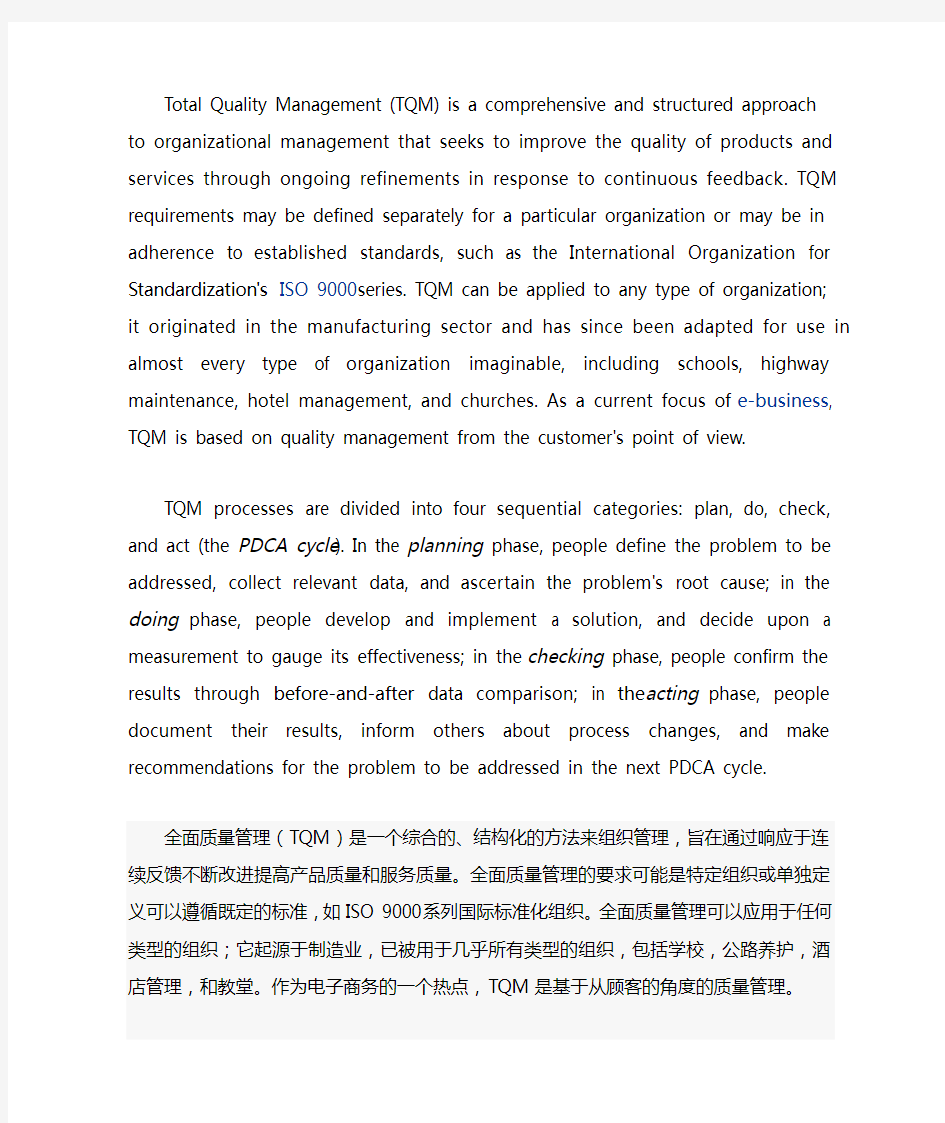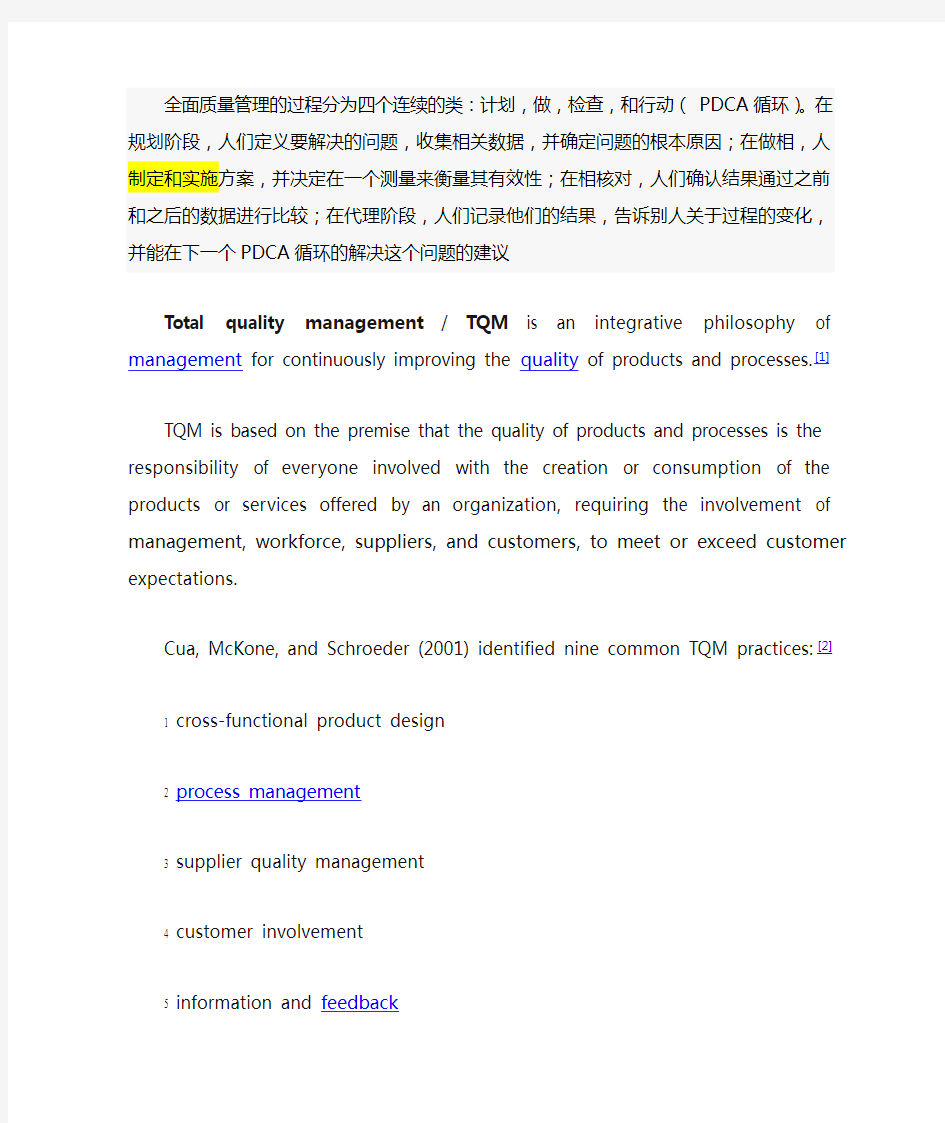

Total Quality Management (TQM) is a comprehensive and structured approach to organizational management that seeks to improve the quality of products and services through ongoing refinements in response to continuous feedback. TQM requirements may be defined separately for a particular organization or may be in adherence to established standards, such as the International Organization for Standardization's ISO 9000series. TQM can be applied to any type of organization; it originated in the manufacturing sector and has since been adapted for use in almost every type of organization imaginable, including schools, highway maintenance, hotel management, and churches. As a current focus of e-business, TQM is based on quality management from the customer's point of view.
TQM processes are divided into four sequential categories: plan, do, check, and act (the PDCA cycle). In the planning phase, people define the problem to be addressed, collect relevant data, and ascertain the problem's root cause; in the doing phase, people develop and implement a solution, and decide upon a measurement to gauge its effectiveness; in the checking phase, people confirm the results through before-and-after data comparison; in the acting phase, people document their results, inform others about process changes, and make recommendations for the problem to be addressed in the next PDCA cycle.
全面质量管理(TQM)是一个综合的、结构化的方法来组织管理,旨在通过响应于连续反馈不断改进提高产品质量和服务质量。全面质量管理的要求可能是特定组织或单独定义可以遵循既定的标准,如ISO 9000系列国际标准化组织。全面质量管理可以应用于任何类型的组织;它起源于制造业,已被用于几乎所有类型的组织,包括学校,公路养护,酒店管理,和教堂。作为电子商务的一个热点,TQM是基于从顾客的角度的质量管理。
全面质量管理的过程分为四个连续的类:计划,做,检查,和行动(PDCA循环)。在规划
阶段,人们定义要解决的问题,收集相关数据,并确定问题的根本原因;在做相,人制定和实施方案,并决定在一个测量来衡量其有效性;在相核对,人们确认结果通过之前和之后的数据进行比较;在代理阶段,人们记录他们的结果,告诉别人关于过程的变化,并能在下一
个PDCA循环的解决这个问题的建议
Total quality management / TQM is an integrative philosophy of management for continuously improving the quality of products and processes.[1]
TQM is based on the premise that the quality of products and processes is the responsibility of everyone involved with the creation or consumption of the products or services offered by an organization, requiring the involvement of management, workforce, suppliers, and customers, to meet or exceed customer expectations.
Cua, McKone, and Schroeder (2001) identified nine common TQM practices:[2] 1cross-functional product design
2process management
3supplier quality management
4customer involvement
5information and feedback
6committed leadership
7strategic planning
8cross-functional training
9employee involvement
全面质量管理/全面质量管理是持续改进产品和过程的质量管理的一个综合性的哲学。[ 1 ]
全面质量管理是基于一个前提,产品和过程的质量是每个人的责任参与或消费创造的产品或服务的组织提供的,需要管理,员工,供应商,客户的参与,以满足或超越客户的期望。
CUA,麦科恩,和施罗德(2001)确定了九种常见的全面质量管理的做法:[ 2 ]
1.cross-functional产品设计
2.process管理
3.supplier质量管理
4.customer参与
https://www.doczj.com/doc/986654773.html,rmation和反馈
https://www.doczj.com/doc/986654773.html,mitted领导
7.strategic规划
8.cross-functional训练
9.employee参与
TQM stands for total quality management. TQM is a management approach for an organization, centered on quality, based on the participation of all its members. It focuses on long-term success through identifying and prioritizing customer requirements, setting and aligning goals, and
providing deliverables that warrant customer satisfaction (as well as customer delight). It also measures results to continually provide value and benefits to all members of the organization and to society.
Total Quality Management is the integration of all functions and processes within an organisation in order to achieve continuous improvement of the quality of goods and services. TQM is based on a number of ideas. It means thinking about quality in terms of all functions of the enterprise and is a start to finish process that integrates interrelated functions at all levels全面质量管理是全面质量管理。全面质量管理是一个组织的管理方法,以质量,基于其所有成员的参与。它注重长期成功通过确定和优先考虑客户的要求,设置和调整的目标,并提供可交付成果,令客户满意(以及客户高兴)。它也措施的结果持续到组织的所有成员提供的价值和效益和社会。
全面质量管理是所有功能和过程的整合在一个组织为了实现产品和服务质量的持续改进。TQM是基于一个想法。这意味着在企业的所有功能方面考虑质量,是一个从开始到结束的过程,结合相关的各级职能